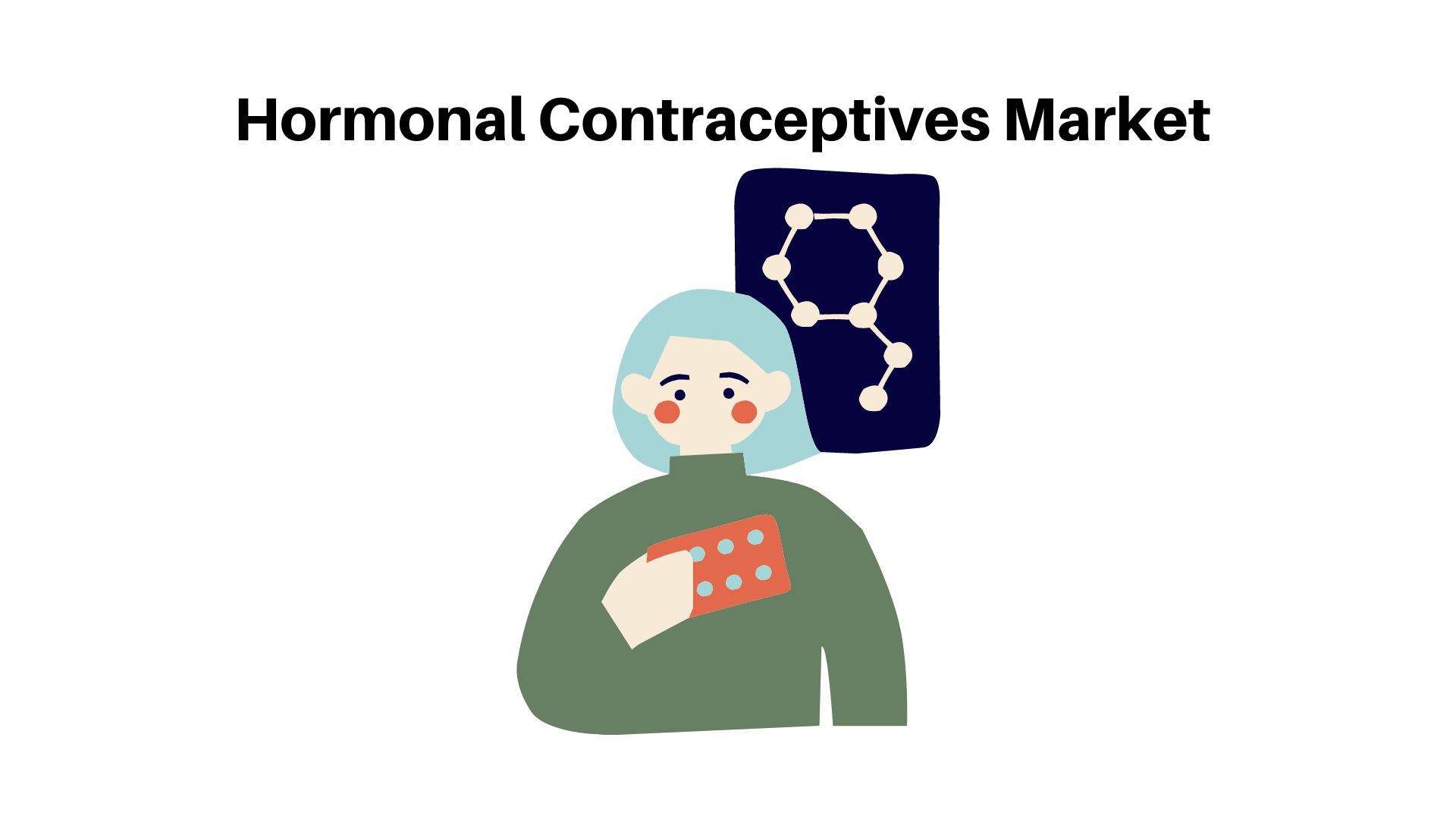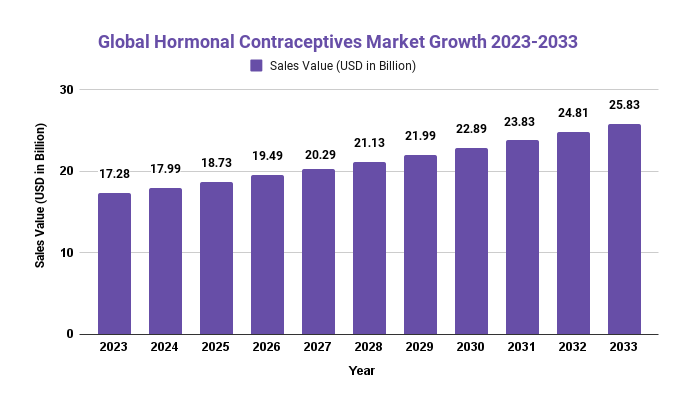Global Hormonal Contraceptives Market Size is Projected to Reach USD 25.83 Bn by 2033

Page Contents
Hormonal Contraceptives Market Overview
Published Via 11Press: The global hormonal contraceptives market size is projected to reach USD 25.83 Bn by 2033 from an estimated 17.28 Bn in 2023, growing at a compound annual growth rate (CAGR) of 4.1% between 2023 and 2033.
The demand for hormonal contraceptives is being driven by several factors, including an increasing awareness of family planning, a preference for non-invasive methods, and government initiatives to promote their use. Furthermore, the rising incidence of unintended pregnancies and the need for effective birth control methods have contributed to an increase in demand for hormonal contraceptives. Furthermore, the growing female population and delaying pregnancy trends are fueling demand as well. Various forms of hormonal contraceptives like oral pills, patches, injections, and vaginal rings are available on the market which further spurs demand.
What is Hormonal Contraception?
Hormonal contraception is a type of birth control that uses hormones to prevent pregnancy. It works by either blocking the release of an egg from the ovary or by making cervical mucus thicker, which makes it harder for sperm to reach the egg and fertilize it. Hormonal contraceptives are available in various forms such as birth control pills, implants, injections, patches and rings. All types of hormonal contraception need to be taken regularly for them to be effective.
Birth control pills are probably the most commonly used form of hormonal contraceptives. These pills contain synthetic versions of two hormones naturally produced in a woman’s body – estrogen and progestin. The amount of these hormones can vary depending on the type of pill being used – some have higher doses while others have lower doses.
Request For Sample Report Here: https://market.us/report/hormonal-contraceptives-market/request-sample/
Market Trends
The hormonal contraceptives market has experienced rapid growth over the past several years, due to increased awareness about the need for reliable and affordable contraception. Demand for long-acting reversible contraceptives (LARC), such as implants or intrauterine devices, is driving this trend due to their convenience and effectiveness compared with other methods. Furthermore, greater access to healthcare services in developing countries has enabled more women to utilize these products.
Oral contraceptives remain the most popular type of hormonal contraception due to their ease of use and cost-effectiveness. However, there has been an emergence in other methods such as injectables, implants, and intrauterine devices which offer longer-term protection against pregnancy. Furthermore, manufacturers are launching novel products like transdermal patches which offer better control over dosing regimens.

Key Takeaways
- The global hormonal contraceptives market size is projected to reach USD 25.83 Bn by 2033.
- Market is growing at a compound annual growth rate (CAGR) of 4.1% between 2023 and 2033.
- The global hormonal contraceptives market is expected to witness significant growth over the forecast period due to factors such as rising awareness about family planning, an increasing preference for non-invasive methods of contraception and government initiatives designed to promote their use.
- Oral contraceptives are the most widely prescribed type of hormonal contraception, though other methods such as patches, injections and vaginal rings are becoming increasingly popular too.
COVID-19 Impact On Hormonal Contraceptives Market
The COVID-19 impact on hormonal contraceptives market's remains somewhat negative due to a decline in family planning activities, the need for unintended pregnancy prevention during pandemics, and the fact that these contraceptives primarily serve this purpose. According to UNFPAs, family planning activities have decreased by 3.6% in 2020 compared to COVD-19 levels.
Drivers
- Rising global population and increasing demand for family planning services.
- Growing awareness and education about reproductive health and contraception.
- Increased availability and accessibility of hormonal contraceptives, particularly in developing countries.
- Advancements in technology and product development, leading to the introduction of new and more effective hormonal contraceptives.
- Growing acceptance and use of long-acting reversible contraceptives (LARCs), such as intrauterine devices (IUDs) and hormonal implants.
Unmet Market Needs for Contraceptives to Drive Market Growth
- The reliability of hormonal contraceptives is higher than condoms or sponges/diaphragms.
- A NCBI study found that only one in 1,000 women will get pregnant when they use these contraceptives correctly.
- It is important to increase its supply in niche areas worldwide because of the rising unmet demand for contraceptives.
- According to the World Health Organization (WHO), around ~24% African women are unmet with modern contraception.
- The unmet needs in Asia and Latin America & the Caribbean are ~10% and ~10.5%, respectively. This huge gap between supply and demand will likely increase market growth over the forecast period.
Interested to Procure the Data? Inquire here at https://market.us/report/hormonal-contraceptives-market/#inquiry
Restraints
- Concerns over the safety and side effects of hormonal contraceptives, particularly in the context of long-term use.
- Stigma and cultural barriers to the use of contraception, particularly in certain regions and communities.
- Lack of access to healthcare services and limited availability of contraceptives in certain regions, particularly in low-income countries.
- Competition from non-hormonal contraceptive methods, such as condoms and natural family planning.
Side Effects Could Restrict Market Growth
- Side effects include nausea, headaches, sore breasts and vaginal yeast infections (thrush), which can be a problem.
- Hormones can cause spotting during periods, mood swings, and may decrease women's sexual desire.
- There is also a slight chance of blood clots (thrombosis) forming. Women over 40 years old, women who smoke, have high blood pressure, and women with a family history of vascular disease are at higher risk. These potential disadvantages could hinder market growth.
Opportunities
- A growing need for non-contraceptive contraceptives that offer health benefits, such as reducing the risk of certain cancers and menstrual disorders, is providing consumers with more choices.
- Expanding into new markets, especially those in developing countries with increasing demand for family planning services, is a must.
- Development of more effective hormonal contraceptives, including those with lower doses and fewer side effects.
- Digital technology has been integrated into hormonal contraceptives, such as mobile apps and wearable devices.
Challenges
- Limited access to education and awareness programs about contraception in certain regions and communities.
- Difficulty in developing affordable and accessible hormonal contraceptives that meet the needs of diverse populations.
- Regulatory challenges and approval processes for new and innovative contraceptive products.
- Public distrust of pharmaceutical companies and skepticism about the safety and efficacy of hormonal contraceptives.
Market Key Players
- Abbvie Inc.
- Afaxys, Inc.
- Bayer AG
- Pfizer, Inc
- Johnson & Johnson
- Janssen Pharmaceuticals Inc.
- Lupin Pharmaceuticals Inc.
- Pregna International Ltd.
- The Female Health Company
- Teva Pharmaceutical Industries Limited
- Mylan N.V.
- Ansell LTD
- Merck & Co. Inc.
- Church & Dwight, Co, Inc.
- Mayer Laboratories
- Novartis ag
- Agile Therapeutics
- Other Key Players
Purchase This Report Via this Secured Link and Avail Discount: Buy the report!
Recent Developments
- Introduction of New Products: Several companies are developing and launching new hormonal contraceptive products, such as the approval of Annovera, a vaginal ring that can be used for a year, by the FDA in 2018.
- Increasing Use of Long-Acting Contraceptives: There has been a trend towards the use of long-acting contraceptive methods, such as intrauterine devices (IUDs) and hormonal implants, as they provide more effective and long-term protection against pregnancy.
- Focus on Emerging Markets: Major companies in the market are increasingly focusing on emerging markets such as Asia-Pacific and Latin America, where there is a high potential for growth due to increasing awareness and government initiatives.
- Digital Technology: Some companies are exploring the use of digital technology, such as mobile apps, to improve adherence to hormonal contraceptives and provide additional support and information to users.
- July 2022: Organon Group and Cirqle biomedical have inked a license agreement to offer non-hormonal on-demand preventive solutions to people. This company embraces innovation and can offer new options to women.
- August 2022: The U.S. FDA has approved Bayer's long-acting, reversible intrauterine device Mirena. This offers extended preventive duration with an efficacy range from six to eighteen years.
- February 2020: Afaxys Pharma LLC and TherapeuticsMD Inc. jointly announced an agreement to expand access to ANNOVERA (ethinyl Estradiol) medication.
Market Segmentation
By Product Type
- Emergency Contraceptive Pills
- Oral Contraceptive Pills
- Vaginal Rings
- Injectable Birth Control
- Intrauterine Device (IUD)
- Transdermal Skin Patches
- Others
By Hormones Type
- Combined Hormonal Contraceptive
- Progestin-Only Contraceptive
By User’s Age Type
- 15-24 Year
- 25-34 Years
- 35-44 Years
- Above 44 Years
By End User Type
- Gynecology Centers
- Household
- Ambulatory Surgical Centers
- Hospitals
- Clinics
- Others
Report Scope
| Report Attribute | Details |
| Market size value in 2023 | USD 17.28 Billion |
| Revenue forecast by 2033 | USD 25.83 Billion |
| Global Market Growth Rate (2023 to 2033) | CAGR of 4.1% |
| Regions Covered | North America, Europe, Asia Pacific, Latin America, and Middle East & Africa, and Rest of the World |
| Historical Years | 2017-2022 |
| Base Year | 2022 |
| Estimated Year | 2023 |
| Short-Term Projection Year | 2028 |
| Long-Term Projected Year | 2032 |
Contact us
Contact Person: Mr. Lawrence John
Market.us (Powered By Prudour Pvt. Ltd.)
Tel: +1 718 618 4351
Send Email: [email protected]
FAQ.
Hormonal contraceptives are medications that use synthetic hormones to prevent pregnancy by suppressing ovulation, thickening cervical mucus, and altering the lining of the uterus. They are available in a variety of forms, including pills, patches, injections, and implants.
When used correctly and consistently, hormonal contraceptives are highly effective in preventing pregnancy, with a failure rate of less than 1%.
Common side effects of hormonal contraceptives include nausea, headaches, breast tenderness, and changes in menstrual bleeding patterns. More serious side effects, such as blood clots and stroke, are rare but can occur.
Hormonal contraceptives are generally considered safe for long-term use, although there are some concerns about the potential risks of certain formulations, such as those containing high doses of estrogen.
Yes, there are several non-hormonal contraceptive options available, including condoms, diaphragms, cervical caps, and natural family planning methods.
The team behind market.us, marketresearch.biz, market.biz and more. Our purpose is to keep our customers ahead of the game with regard to the markets. They may fluctuate up or down, but we will help you to stay ahead of the curve in these market fluctuations. Our consistent growth and ability to deliver in-depth analyses and market insight has engaged genuine market players. They have faith in us to offer the data and information they require to make balanced and decisive marketing decisions.



